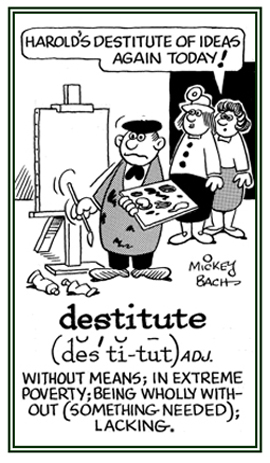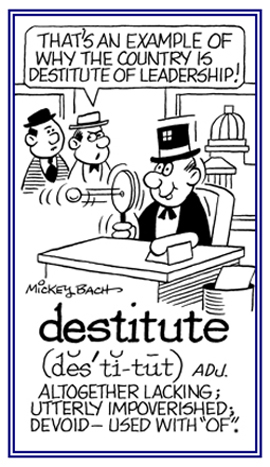de-
(Latin: from, away from, off; down; wholly, entirely, utterly, complete; reverse the action of, undo; the negation or reversal of the notion expressed in the primary or root word)
A process by which something becomes completely dry: The soil desiccation makes it much more difficult to raise crops.
The desiccation of so many farms has been causing severe financial losses for farmers.
design (verb), designs, designed; designing
designate (verb), designates; designated; designating
designation
designedly
desirable (adjective), more desirable, most desirable
1. Referring to something worth having or doing: The more desirable and valuable items the store was offering were located inside for many customers.
2. The capacity of having pleasing characteristics: The young lady who was invited to Mr. and Mrs. Smart's luncheon was a very desirable person who was beautiful and had a lovely way of conversing with other guests.
2. The capacity of having pleasing characteristics: The young lady who was invited to Mr. and Mrs. Smart's luncheon was a very desirable person who was beautiful and had a lovely way of conversing with other guests.
desire (verb), desires; desired; desiring
1. To want something very strongly; to long for; to crave; to want.
2. To wish for and to request something.
3. A longing or craving, as for something that brings satisfaction or enjoyment: "She had a desire for fame."
4. An expressed wish; a request.
5. Etymology: from Old French desirer, which came from Latin desiderare, "to long for, to wish for"; the original sense possibly was "await what the stars will bring"; from the phrase de sidere, "from the stars"; from sidus, and sideris (the genitive form), "heavenly body, star, constellation".
2. To wish for and to request something.
3. A longing or craving, as for something that brings satisfaction or enjoyment: "She had a desire for fame."
4. An expressed wish; a request.
5. Etymology: from Old French desirer, which came from Latin desiderare, "to long for, to wish for"; the original sense possibly was "await what the stars will bring"; from the phrase de sidere, "from the stars"; from sidus, and sideris (the genitive form), "heavenly body, star, constellation".
desist (verb), desists; desisted; desisting
1. To abstain from consuming: Since Jill was on a diet, she desisted eating ice cream for a while.
2. To refrain from achieving or trying to continue: After raking the leaves for more than two hours, Susan desisted and quit until the next day.
2. To refrain from achieving or trying to continue: After raking the leaves for more than two hours, Susan desisted and quit until the next day.
The students wouldn't desist and kept on protesting for "Fridays for Future", hoping that the government would finally act on saving the environment.
despair
1. The feeling that someone has that everything is wrong, there is no hope, and nothing will turn out well.
2. The condition in which everything seems wrong and will turn out badly.
3. Someone, or something, that makes a person feel hopeless or exasperated.
4. Etymology: from Old French desperer, "to lose hope, to despair"; from Latin desperare, "to lose hope"; from de-, "without" + sperare, "to hope" from spes, "hope".
2. The condition in which everything seems wrong and will turn out badly.
3. Someone, or something, that makes a person feel hopeless or exasperated.
4. Etymology: from Old French desperer, "to lose hope, to despair"; from Latin desperare, "to lose hope"; from de-, "without" + sperare, "to hope" from spes, "hope".
despairingly
A description of someone feeling that there is no hope and that the person can do nothing to improve a difficult or troubling situation.
destitute (adjective); more destitute, most destitute
A reference to a person who is without the resources or material goods that are needed to live on: Although Jasper and Abbey are poor and destitute men, they don't ask other people for financial help.

© ALL rights are reserved.

© ALL rights are reserved.
Go to this Word A Day Revisited Index


Go to this Word A Day Revisited Index
so you can see more of Mickey Bach's cartoons.
The plight or a hopeless condition of complete despair: After Floyd lost his job, didn't have any money, was starving, and needing immediate medical care, he was in a state of destitution!
destroy (verb), destroys; destroyed; destroying
1. To cause so much damage to something that it is completely ruined or does not exist any more: "The fire completely destroyed the building."
2. To demolish something or to reduce something into fragments: "All of the files were destroyed."
3. To ruin something or to make it useless; as well as, to abolish, to rescind, or to end it.
4. To ruin; to spoil; or to render someone or something useless: "He had a disease that destroys the body."
5. To annihilate, to crush, to subdue, or to defeat.
6. To be destructive or to cause destruction: "The gas explosion destroyed several stores in the business district."
7. Etymology: from early 13th century, from Old French destruire in the 12th century and then Modern French détruire, "to destroy, to ravage, to lay waste"; from Vulgar Latin destrugere, "refashioned" that is influenced by destructus; from Latin destruere, "to tear down, to demolish"; literally, "un-build" from de- "un-, down" + struere. "to pile, to build".
2. To demolish something or to reduce something into fragments: "All of the files were destroyed."
3. To ruin something or to make it useless; as well as, to abolish, to rescind, or to end it.
4. To ruin; to spoil; or to render someone or something useless: "He had a disease that destroys the body."
5. To annihilate, to crush, to subdue, or to defeat.
6. To be destructive or to cause destruction: "The gas explosion destroyed several stores in the business district."
7. Etymology: from early 13th century, from Old French destruire in the 12th century and then Modern French détruire, "to destroy, to ravage, to lay waste"; from Vulgar Latin destrugere, "refashioned" that is influenced by destructus; from Latin destruere, "to tear down, to demolish"; literally, "un-build" from de- "un-, down" + struere. "to pile, to build".
destroyable (adjective), more destroyable, most destroyable
1. Capable of reducing an object to useless fragments, a useless form, or remains: The glass vase was destroyable as it turned out when it fell on the floor and the pieces were scattered around.
2. That which can be injured beyond repair or renewal; demolishable; ruinable; annihilable: The house proved to be destroyable as was shown by the results of the tornado.
2. That which can be injured beyond repair or renewal; demolishable; ruinable; annihilable: The house proved to be destroyable as was shown by the results of the tornado.
1. A small, fast, highly maneuverable warship armed with guns, torpedoes, depth charges, and guided missiles.
2. A person who ruins, or lays waste to something: "Henry was convicted of being the destroyer of the neighbor's car."
3. Someone or something that causes destruction: "The document describes alcohol as a destroyer of families."
2. A person who ruins, or lays waste to something: "Henry was convicted of being the destroyer of the neighbor's car."
3. Someone or something that causes destruction: "The document describes alcohol as a destroyer of families."


